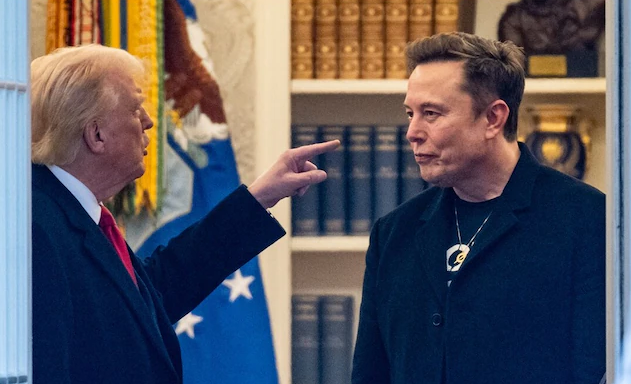US President Donald Trump dramatically intensified his confrontation with former ally Elon Musk, threatening to deploy the Department of Government Efficiency (DOGE), the cost-cutting agency Musk once led, against the billionaire.
“DOGE is the monster that might have to go back and eat Elon,” Trump declared to reporters outside the White House on Tuesday before travelling to Florida’s “Alligator Alcatraz” detention centre. When questioned about potentially deporting Musk to South Africa, the president responded:
I don’t know, we’ll have to take a look.
The statements mark the latest escalation in a bitter feud sparked by Musk’s opposition to Trump’s signature “One Big, Beautiful Bill.” Musk contends the legislation enables presidential overreach, asserting that “the crux” involves “removal of funding for enforcement of federal contempt of court orders.”
This is nominally aimed at removal of illegal immigrants, but obviously also enables many other abuses of power by the President.
Musk threatened to establish a new political party if the bill passes. He specifically targeted Republican supporters, warning conservative lawmakers:
Every member of Congress who campaigned on reducing government spending and then immediately voted for the biggest debt increase in history should hang their head in shame! And they will lose their primary next year if it is the last thing I do on this Earth.
The core disagreement centres on fiscal policy. Musk condemns the bill’s record $5 trillion debt ceiling increase as “debt slavery,” arguing it undermines his DOGE cost-cutting achievements. Trump counters that Musk’s stance stems from self-interest, particularly the elimination of electric vehicle subsidies benefiting Tesla.
Trump escalated hostilities early Tuesday, suggesting DOGE scrutinise Musk’s government subsidies:
Elon may get more subsidy than any human being in history, by far, and without subsidies, Elon would probably have to close up shop and head back home to South Africa.
The rupture carries profound financial and political consequences. Musk spent $275 million securing Trump’s 2024 victory and pledged another $100 million for 2026 midterms, now in doubt. During their feud in June, Tesla shares plummeted 14%, erasing about $150 billion in value, whereas Trump Media fell 8%.
Though tensions temporarily eased when Musk agreed not to decommission SpaceX’s NASA-critical Dragon spacecraft, Trump’s latest threats signal enduring animosity. Trump explicitly warned Musk against funding Democratic candidates:
If he does, he’ll have to pay the consequences for that. He’ll have to pay very serious consequences if he does that.
This unprecedented threat by a sitting president toward a private citizen underscores the rift’s severity. Vice President J.D. Vance characterised Musk as an “emotional guy” making a “huge mistake,” urging him to “chilled out a little bit.”
The conflict’s roots extend beyond policy. Trump retaliated against Musk in May by withdrawing the NASA nomination of Jared Isaacman, a close Musk associate, days after Musk left government service. This followed March restrictions on Musk’s DOGE authority after cabinet complaints about his “hatchet” approach to budget cuts.
